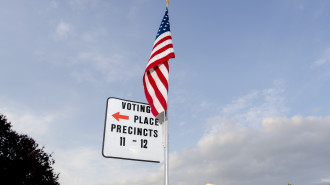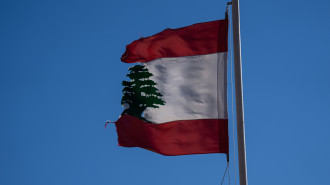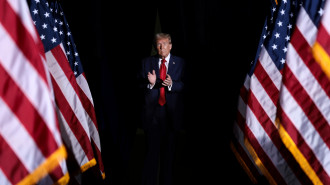![People place fake coffins in front of the fire-ravaged coronavirus isolation ward of Al-Hussein hospital, during a protest in the southern Iraqi city of Nasiriyah, on July 15, 2021. [Getty]](/sites/default/files/styles/image_360x240/public/2021-07/GettyImages-1233996068.jpg?h=199d8c1f&itok=Akj8H7vp)
The Iraq Report: Deadly Nasiriyah blaze reignites fury over Iraq’s healthcare as Iran’s influence grows
![People place fake coffins in front of the fire-ravaged coronavirus isolation ward of Al-Hussein hospital, during a protest in the southern Iraqi city of Nasiriyah, on July 15, 2021. [Getty]](/sites/default/files/styles/image_360x240/public/2021-07/GettyImages-1233996068.jpg?h=199d8c1f&itok=Akj8H7vp)
A deadly fire tore through a hospital in Iraq's southern city of Nasiriyah earlier this week, claiming at least 60 fatalities with hundreds more suffering from burns and the effects of smoke inhalation.
This was the second major fire at an Iraqi hospital in the past three months and has led to an outpouring of grief and fury as Iraqi officials continue to fail to address an increasingly frail health system.
Meanwhile, Iraqi woes also take on an international dimension in the continuing conflict between Iran and the US being fought by proxy on Iraqi soil. Senior Iranian commanders have cautioned the Iraqi government against being too optimistic about Shia militia proxies being reined in, in fact, urging escalations against the American presence in Iraq.
With elections just around the corner in October, it appears that the current administration of Prime Minister Mustafa al-Kadhimi will face a high hurdle in convincing voters that its legislative agenda deserves their support.
Nasiriyah hospital fire feeds discontent
A deadly fire that tore through a Covid-19 unit at a hospital in Nasiriyah on 12 July has triggered protests and calls for greater accountability amid wider unrest over power shortages in scorching summer temperatures.
The blaze was originally said to have killed 90 people, but the figure was revised down to 60 by the Dhi Qar health directorate which has claimed to have identified 39 of the victims and returned their bodies to their families for burial.
"You can go to hospital in Iraq with a flu, and come back as a piece of charcoal for your family to bury"
The fire was allegedly caused by an explosion caused by the improper storage of highly flammable oxygen cylinders.
This is the second major fire to break out in an Iraqi hospital in less than three months after a deadly blaze in another Covid-19 ward at a Baghdad hospital in April claimed the lives of 82 people. That fire was also caused by exploding oxygen tanks.
In the direct aftermath of that incident, Health Minister Hassan al-Tamimi resigned from his post. Tamimi is a Shia Islamist loyal to the Sadrists, a political bloc led by notoriously violent and sectarian cleric and militia leader Muqtada al-Sadr.
Iraqis have been protesting since Monday and calling for officials to face criminal charges.
"It's like one analyst said - you can go to hospital in Iraq with a flu, and come back as a piece of charcoal for your family to bury," one protester, Saad Jawad, told The New Arab.
|
|
Others lamented the state of the country in general, adding that the health system was as neglected as other sectors in Iraq.
"Find me another country in the world that has 50-degree heat, exploding hospitals, and no power to run air conditioning units - while being one of the richest in the world in terms of oil," Hussein Abu Jafar, another demonstrator, said.
"What is happening to Iraqis is criminal. We have no voice. We scream but only the dead hear us."
Iraq's healthcare issues extend as far back as the rule of former dictator Saddam Hussein. While Saddam's regime originally ran a well-regarded healthcare system and produced top-tier medical professionals, international sanctions and the aftermath of the Gulf War in 1991 crippled the health sector.
The sanctions regime and the continuous bombing of Iraqi cities led to a brain drain with many Iraqi medical professionals fleeing the country and seeking employment in more stable countries in the West.
"We have no voice. We scream but only the dead hear us"
In 2003, matters became worse as the new US-sponsored regime inherited an already-frail system and made it worse through political horse-trading and corruption whereby individual powerful political parties and blocs would each control individual ministries and their budgets, leading to widespread graft.
As noted above, the former health minister was directly tied to the Sadrists, the bloc with the most seats in the Iraqi legislature.
The corruption has hollowed out Iraq's healthcare system so that, by the time the Covid-19 pandemic struck Iraq in early 2020, the health sector was already buckling and was singularly incapable of dealing with the outbreak.
A Reuters investigation last year into the Iraqi health system painted a bleak picture of a corrupt system that was struggling to stay afloat, with a shortage of qualified professionals, drugs, and medicines, coupled with rampant neglect that saw only 2.5% of the national budget in 2019 dedicated to health, while 18% went to security forces.
It is, therefore, unsurprising that a senior official within Prime Minister Kadhimi's office described Iraqi hospitals as ticking "time bombs" that could literally explode and cause untold numbers of casualties and fatalities in a place Iraqis should be able to go to get better, not face death.
Iran encourages Shia militias to attack US targets
As Iraq continues to grapple with power outages, scorching summer temperatures, and the devastating impact of the coronavirus outbreak, it still finds itself the arena in which Iran and the US attempt to settle scores.
Last week, a senior Iranian Islamic Revolutionary Guard Corps (IRGC) commander urged his Iraqi Shia proxies to not only continue to attack American forces and interests in Iraq but to widen their attacks against US interests in Syria.
"Such is the IRGC presence that the Biden administration has occasionally retaliated against attacks it has suffered in Iraq by striking at Shia militias - all subordinate to the PMF - in Syria"
Iraqi Shia militias operating under the umbrella of the Popular Mobilisation Forces (PMF) are known to closely cooperate with the IRGC and have been touted as the future Iraqi version of the IRGC, being groomed for the role by the Iranian regime to ensure Iraq remains under its influence.
The Iraqi government is unable to control the PMF
Although the PMF is a formal part of the Iraqi armed forces and is nominally under the command of Prime Minister Kadhimi, he and his predecessors have shown little ability to exert control over them.
Both former PMS, Haidar al-Abadi and Adel Abdul Mahdi, had issued orders for the PMF not to undertake extraterritorial operations. Despite this, the PMF has continued to operate under the command and control of the IRGC in Syria.
Such is their presence that the Biden administration has occasionally retaliated against attacks it has suffered in Iraq by striking at Shia militias - all subordinate to the PMF - in Syria.
Kadhimi himself has struggled to rein in the PMF and its component militias who have also been implicated in the deaths of unarmed protesters. In May, Kadhimi ordered the arrest of senior PMF commander Qasem Muslih only to be brow-beaten into releasing him without charge not long after.
With both Washington and Tehran currently engaged in negotiations in Vienna to revive the Iran nuclear deal, it appears to be clear that Iran wants to continue to exert pressure on the Americans by destabilising Iraq and making it inhospitable to US interests.
By widening attacks against American forces in Syria, Iraqi militias will not be doing anything extraordinary as they have been present in the Syrian theatre of conflict for years. However, they will be bringing pressure to bear on Biden to disengage from Iranian spheres of influence just as Washington is in the midst of drawing down its 20-year occupation of Afghanistan.
This pressure appears to be bearing fruit as Biden's Middle East and North Africa Coordinator, Brett McGurk, met with Kadhimi to discuss US troop withdrawal from Iraq which has been on the cards since the Trump administration.
With American policy seemingly pivoting towards China in the Asia-Pacific theatres, this will likely lead to a continuing disengagement from the Middle East, a region of the world that has proven to be difficult for the US to navigate and that has cost the American Treasury trillions of dollars since the Global War on Terror was launched by former President George W. Bush in 2001.
"Iran's regional ambitions that were laid bare when senior Iranian officials began bragging about controlling four Arab capitals - Baghdad, Damascus, Beirut, and Sanaa"
From Tehran's perspective, such a disengagement can only benefit its regional ambitions that were laid bare when senior Iranian officials began bragging about controlling four Arab capitals - Baghdad, Damascus, Beirut, and Sanaa.
In exchange for the US lifting international sanctions and allowing Tehran to keep its collection of Arab capitals, Iran may seek to sweeten the deal by offering itself up as a guarantor of stability in the region.
There would be a precedent for this as the government of Shah Mohammed Reza Pahlavi was seen as the US's policeman of the Middle East before Pahlavi was overthrown in 1979 by the founder of the Islamic Republic of Iran, Ayatollah Khomeini.
Iran has shown itself to be a pragmatic power player and, despite anti-American rhetoric, it already has a demonstrable history of cooperating with the US on Iraq and Afghanistan. The potential for them to cut a deal with the US to consolidate their control over Iraq and beyond would therefore be a trend to watch as tensions escalate and negotiations move forward.
The Iraq Report is a regular feature at The New Arab.
Click here to see the full archive
![Protesters deployed a national flag and placed fake coffins in front of the fire-ravaged Al-Hussein hospital in Nasiriyah, on 15 July, 2021. [Getty]](/sites/default/files/styles/medium_16_9/public/2021-07/GettyImages-1233996079.jpg?h=199d8c1f&itok=er2mEIha)

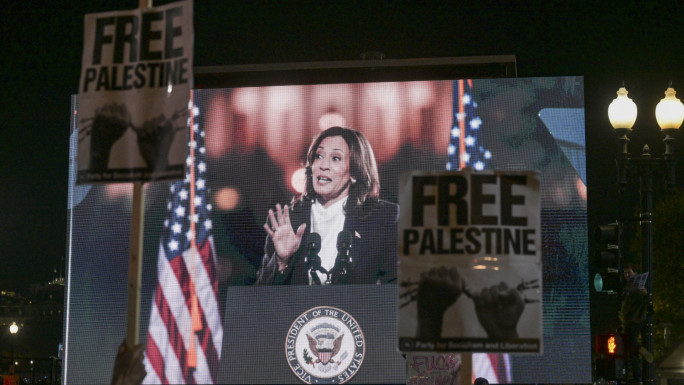
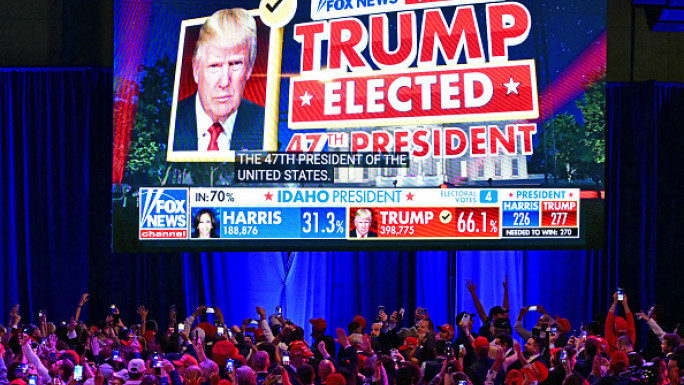
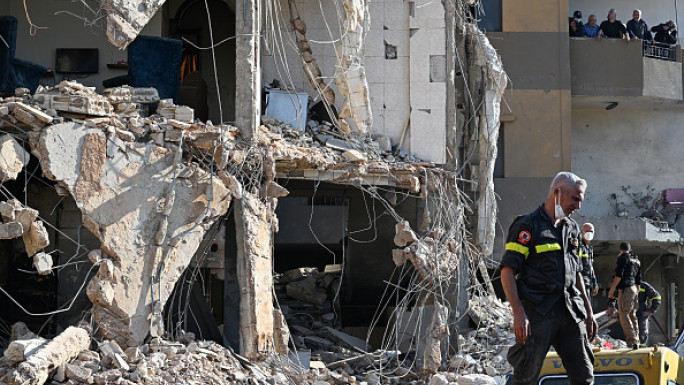
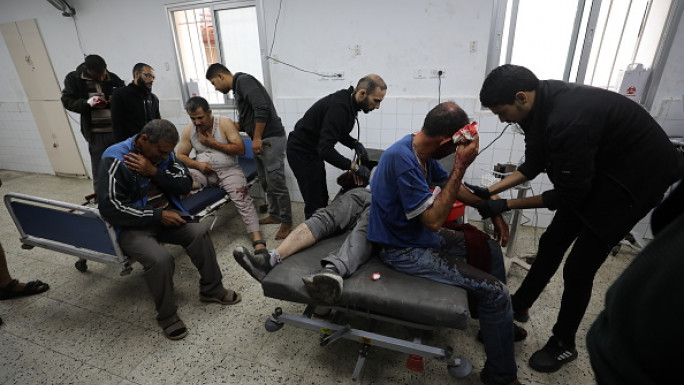
 Follow the Middle East's top stories in English at The New Arab on Google News
Follow the Middle East's top stories in English at The New Arab on Google News
